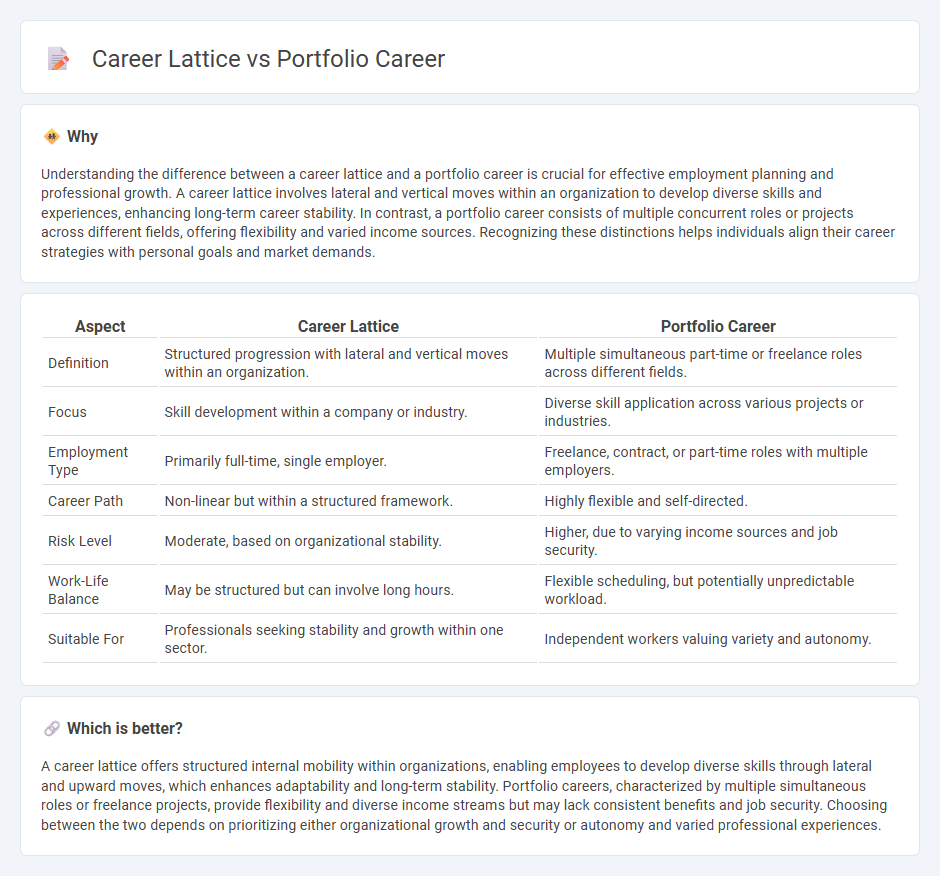
A career lattice offers flexible growth paths within an organization, enabling employees to develop diverse skills without a linear progression. In contrast, a portfolio career consists of multiple simultaneous jobs or projects across various fields, fostering versatility and entrepreneurial spirit. Explore how choosing between a career lattice and a portfolio career can shape your professional future.
Why it is important
Understanding the difference between a career lattice and a portfolio career is crucial for effective employment planning and professional growth. A career lattice involves lateral and vertical moves within an organization to develop diverse skills and experiences, enhancing long-term career stability. In contrast, a portfolio career consists of multiple concurrent roles or projects across different fields, offering flexibility and varied income sources. Recognizing these distinctions helps individuals align their career strategies with personal goals and market demands.
Comparison Table
| Aspect | Career Lattice | Portfolio Career |
|---|---|---|
| Definition | Structured progression with lateral and vertical moves within an organization. | Multiple simultaneous part-time or freelance roles across different fields. |
| Focus | Skill development within a company or industry. | Diverse skill application across various projects or industries. |
| Employment Type | Primarily full-time, single employer. | Freelance, contract, or part-time roles with multiple employers. |
| Career Path | Non-linear but within a structured framework. | Highly flexible and self-directed. |
| Risk Level | Moderate, based on organizational stability. | Higher, due to varying income sources and job security. |
| Work-Life Balance | May be structured but can involve long hours. | Flexible scheduling, but potentially unpredictable workload. |
| Suitable For | Professionals seeking stability and growth within one sector. | Independent workers valuing variety and autonomy. |
Which is better?
A career lattice offers structured internal mobility within organizations, enabling employees to develop diverse skills through lateral and upward moves, which enhances adaptability and long-term stability. Portfolio careers, characterized by multiple simultaneous roles or freelance projects, provide flexibility and diverse income streams but may lack consistent benefits and job security. Choosing between the two depends on prioritizing either organizational growth and security or autonomy and varied professional experiences.
Connection
Career lattice and portfolio career models both emphasize flexibility and skill diversification in employment strategies. A career lattice allows movement in multiple directions within an organization, including lateral and upward shifts, enhancing varied experience. Portfolio careers combine diverse roles or projects across different fields, leveraging the multi-directional growth fostered by a career lattice mindset.
Key Terms
Portfolio career:
A portfolio career involves managing multiple concurrent roles, often spanning different industries or freelance projects, allowing diverse skill application and income streams. This approach fosters flexibility, autonomy, and continuous learning through varied experiences rather than linear advancement. Discover more about how portfolio careers can reshape your professional growth and work-life balance.
Freelancing
A portfolio career involves managing multiple freelance projects across various industries simultaneously, emphasizing skill diversification and flexibility. In contrast, a career lattice entails lateral moves and varied roles within or across organizations, promoting growth through diverse experiences without a linear trajectory. Explore deeper strategies to maximize your freelancing success within these dynamic career frameworks.
Multiple income streams
A portfolio career emphasizes multiple income streams by combining diverse roles, freelance projects, and entrepreneurial ventures to create financial stability and skill variety. A career lattice promotes lateral and diagonal moves within or across organizations to build expertise and expand income potential without the traditional upward trajectory. Explore how these dynamic career models can optimize your professional growth and income diversification.
Source and External Links
Portfolio career - A portfolio career consists of having multiple roles or jobs simultaneously instead of a single job, combining paid and/or voluntary work, providing flexibility, multiple income streams, and exposure to diverse projects; popularized by Charles Handy and common in creative industries and the gig economy.
What Is A Portfolio Career? - A portfolio career involves monetizing skills through multiple income sources rather than a full-time job, often resulting in potentially higher earnings by specializing and balancing various types of work.
WTF is a portfolio career? - It is defined by multiple part-time jobs or income streams that evolve over time, allowing one to pursue diverse passions and work types like consulting, coaching, creative projects, or volunteering all combined in a dynamic mix.
 dowidth.com
dowidth.com